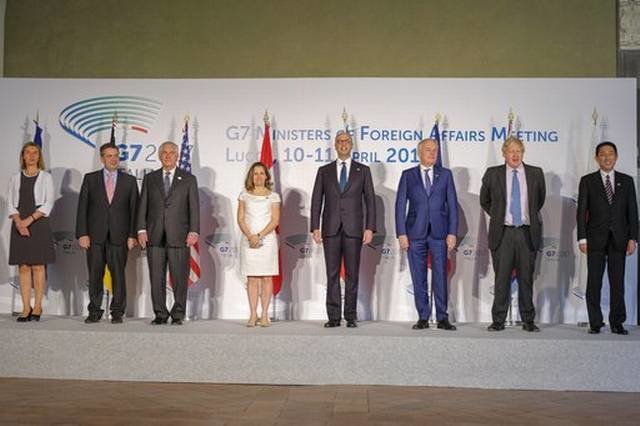G-7 seeks Iran’s help to stabilize Middle East

The Group of Seven foreign ministers who met in the Italian city of Lucca on Tuesday urged Iran to help end the conflicts in the Middle politically, IRNA reported.
In their final statement, the foreign minister also requested Iran’s help to fight terrorism in the region.
“We want Iran to play a constructive role in the region through support for political solutions, reconciliation and peace in Syria, Iraq and Yemen and other regions….and cooperation in the campaign against the spread of terrorism and extremism,” part of the statement said, according to a translation of the statement posted on the IRNA Persian website.
Also on Monday Italian Foreign Minister Angelino Alfano discussed the situation in Syria in a telephone phone call with his Iranian counterpart Mohammad Javad Zarif.
Italy's Foreign Ministry said in a statement on Monday that Zarif repeated Tehran's condemnation of the "unacceptable use of chemical weapons" in a Syrian town last week.
The statement said Alfano urged Iran to use its influence with the Syrian government "to avoid new attacks, completely eliminate chemical weapons and assure a cease-fire."
According to Italy's ministry, the two men agreed to continue their conversation with "a common goal of preventing an escalation of violence" and re-launching a political process for stabilizing Syria.
EU High Representative for Foreign Affairs Federica Mogherini, German Foreign Minister Sigmar Gabriel, U.S. Secretary of State Rex Tillerson, Canada's Foreign Affairs Minister Chrystia Freeland, Italy's Foreign Minister Angelino Alfano, France's Foreign Minister Jean-Marc Ayrault, Britain's Foreign Secretary Boris Johnson, and Japanese Minister of Foreign Affairs Fumio Kishida participated at the G-7 conference.
Seven industrialized nations back Iran’s nuclear deal
The G-7 also threw its back behind the international nuclear deal between Iran and great powers, which includes the five permanent members of the UN Security Council, Germany and the European Union.
The members also said they back the International Atomic Energy Agency in its monitoring of Iran’s nuclear activities.
According to the nuclear deal, officially called the Joint Comprehensive Plan of Action, Iran must roll back its nuclear program in return for termination of economic and financial sanctions. The IAEA is tasked to monitor the implementation of the deal.
The statement also said the UN resolution 2231, which bans the shipment of arms, should be fully implemented.
The resolution endorsed the nuclear deal between Iran and 5+1 group.
PA/PA
